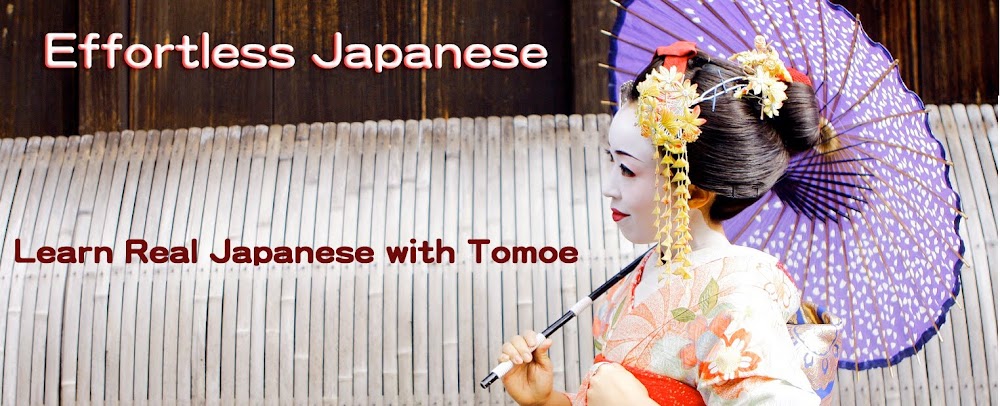Ijiwaru AJ wa iimashita.
いじわる AJ は いいました。
(Ornery AJ said)
「Ayumi-chan wa watashi ga sukidesu.Kanojo wa Taro(anata) ga sukijyanaidesu.」
「あゆみちゃん は わたし が すきです。かのじょ は たろう(あなた) が すきじゃないです。」(Ayumi likes me. She doent like Taro(you).)
Taro wa mata nakimashita.
たろう は また なきました。
(Taro cried again.)
Shikashi, kare wa tuyokunarou to omoimashita.
しかし、かれ は つよくなろう と おもいました。
(But he wanted to be strong. )
Soshite Tai ni kitkubokushingu wo benkyoushini ikimashita.
そして タイ に キックボクシング を べんきょう しに いきました。
(And (he) went to Thailand to study Kick boxing.)
☆Word☆
Kanojyo かのじょ= She
Mata また= again
Shikashi しかし = But,however,
Tai タイ= Thailand
kitkubokushingu キックボクシング = Kick boxing
benkyou べんきょう= Study
benkyoushini べんきょうしに = to study,
☆Grammar and Words in the Questions☆☆
...... tuyoku(=Strong) narou(be) to omoimashita(wanted) . (wanted to be strong)
......benkyou(=study) shini / benkyou suru tame ni (to study, for study)
Tuyoi(= Strong) ⇔ Yowai (=week)
Tuyoi (= Strong) ⇔ Tuyoku nai,Tuyoku arimasen (= doent/dont Strong)
Yowai (=week) ⇔ Yowaku nai/Yowaku arimasen
Q : Naze Taro wa tuyokunarou to omoimahita ka? (Why does Taro want to be strong?)
A : Ayumi-chan wa tuyoi hito ga suki dakara desu. ( Ayumi likes a strong man.)
hito= person,a man
Q: Taro wa itumo naiteimasu ka?
A: Taro wa itumo naiteimasu. (Taro cry all the time)
Naiteimasu (is/are crying)
Nakimasita ( Cried)
Q: Naze ayumi-chan wa AJ ga suki desuka? (Why does Ayumi like AJ?)
A: AJ ga tuyoi kara desu. (Because AJ is strong)
Kara(=because)
Q: Naze Taro wa Tai ni ikimashita ka? (Why did Taro go to Thailand? )
A: kitkubokushingu wo benkyoushini ikimashita. (For study of Kick boxing)
Q:Taro wa dokoni ikimashita ka? (where did Taro go?)
A:Taro wa Thailand he/ni ikimashita. (Taro want to Thailand.)
....ni/(h)e ikimasu (= go ....(place) )
....ni/(h)e ikimashita (=went to .....(place))
★Important Question words★
Where = Doko どこ
Who = Dare だれ
What = Nani なに
Why = Naze なぜ
EX) Naze......desu ka? (Why.....?)
........da kara desu. (Because......)
___________________________________
Hi how are you doing?
I think this Podcast little bit difficult for Zero beginners...But just listen and used to Japanese. :)
I think Story is very simple. :)
If you have a question, write on the comment page. :)
Have a great day.
Thank you reading my Blog and listening my Podcast.
Love,
Tomoe
いじわる AJ は いいました。
(Ornery AJ said)
「Ayumi-chan wa watashi ga sukidesu.Kanojo wa Taro(anata) ga sukijyanaidesu.」
「あゆみちゃん は わたし が すきです。かのじょ は たろう(あなた) が すきじゃないです。」(Ayumi likes me. She doent like Taro(you).)
Taro wa mata nakimashita.
たろう は また なきました。
(Taro cried again.)
Shikashi, kare wa tuyokunarou to omoimashita.
しかし、かれ は つよくなろう と おもいました。
(But he wanted to be strong. )
Soshite Tai ni kitkubokushingu wo benkyoushini ikimashita.
そして タイ に キックボクシング を べんきょう しに いきました。
(And (he) went to Thailand to study Kick boxing.)
☆Word☆
Kanojyo かのじょ= She
Mata また= again
Shikashi しかし = But,however,
Tai タイ= Thailand
kitkubokushingu キックボクシング = Kick boxing
benkyou べんきょう= Study
benkyoushini べんきょうしに = to study,
☆Grammar and Words in the Questions☆☆
...... tuyoku(=Strong) narou(be) to omoimashita(wanted) . (wanted to be strong)
......benkyou(=study) shini / benkyou suru tame ni (to study, for study)
Tuyoi(= Strong) ⇔ Yowai (=week)
Tuyoi (= Strong) ⇔ Tuyoku nai,Tuyoku arimasen (= doent/dont Strong)
Yowai (=week) ⇔ Yowaku nai/Yowaku arimasen
Q : Naze Taro wa tuyokunarou to omoimahita ka? (Why does Taro want to be strong?)
A : Ayumi-chan wa tuyoi hito ga suki dakara desu. ( Ayumi likes a strong man.)
hito= person,a man
Q: Taro wa itumo naiteimasu ka?
A: Taro wa itumo naiteimasu. (Taro cry all the time)
Naiteimasu (is/are crying)
Nakimasita ( Cried)
Q: Naze ayumi-chan wa AJ ga suki desuka? (Why does Ayumi like AJ?)
A: AJ ga tuyoi kara desu. (Because AJ is strong)
Kara(=because)
Q: Naze Taro wa Tai ni ikimashita ka? (Why did Taro go to Thailand? )
A: kitkubokushingu wo benkyoushini ikimashita. (For study of Kick boxing)
Q:Taro wa dokoni ikimashita ka? (where did Taro go?)
A:Taro wa Thailand he/ni ikimashita. (Taro want to Thailand.)
....ni/(h)e ikimasu (= go ....(place) )
....ni/(h)e ikimashita (=went to .....(place))
★Important Question words★
Where = Doko どこ
Who = Dare だれ
What = Nani なに
Why = Naze なぜ
EX) Naze......desu ka? (Why.....?)
........da kara desu. (Because......)
___________________________________
Hi how are you doing?
I think this Podcast little bit difficult for Zero beginners...But just listen and used to Japanese. :)
I think Story is very simple. :)
If you have a question, write on the comment page. :)
Have a great day.
Thank you reading my Blog and listening my Podcast.
Love,
Tomoe










